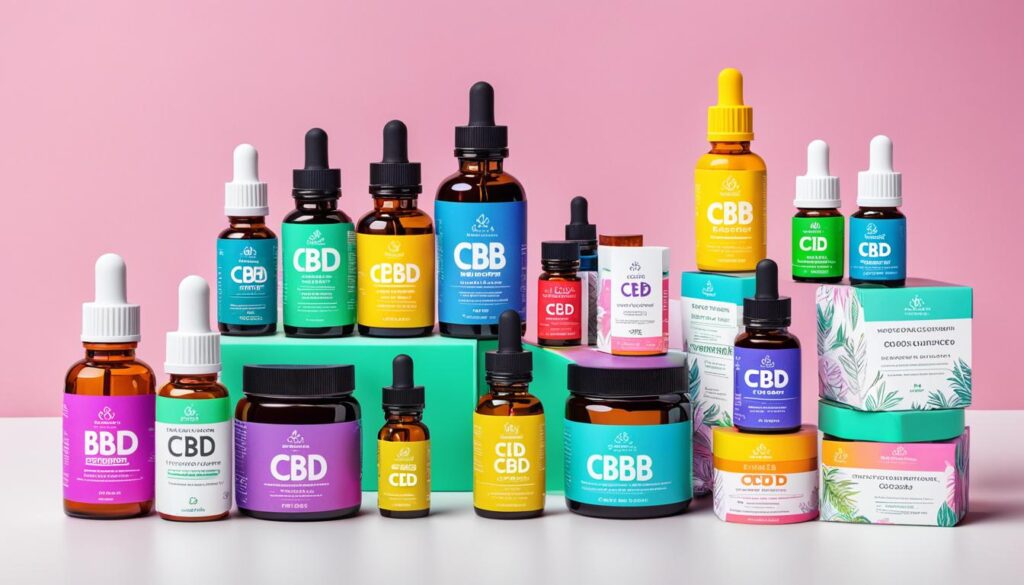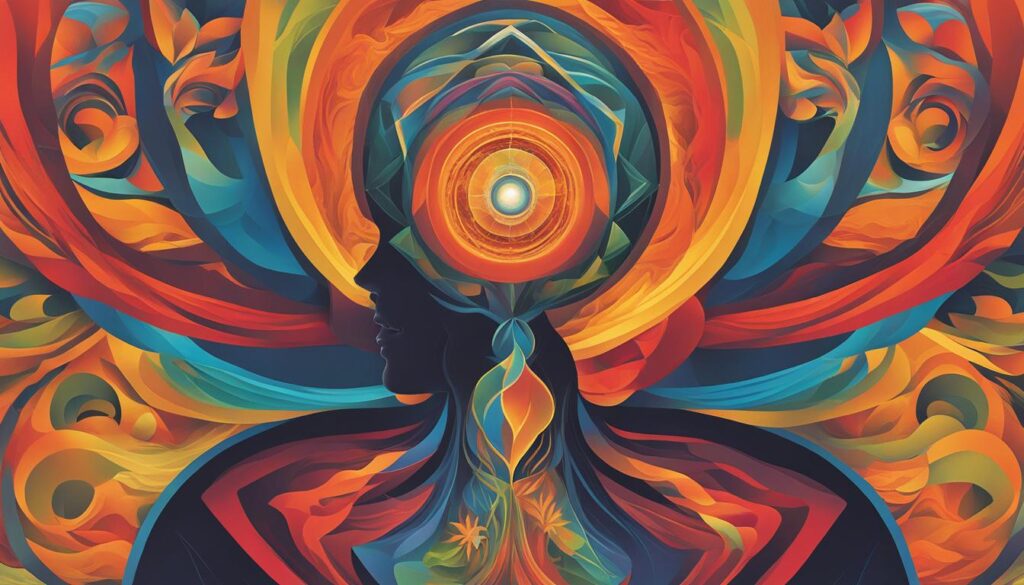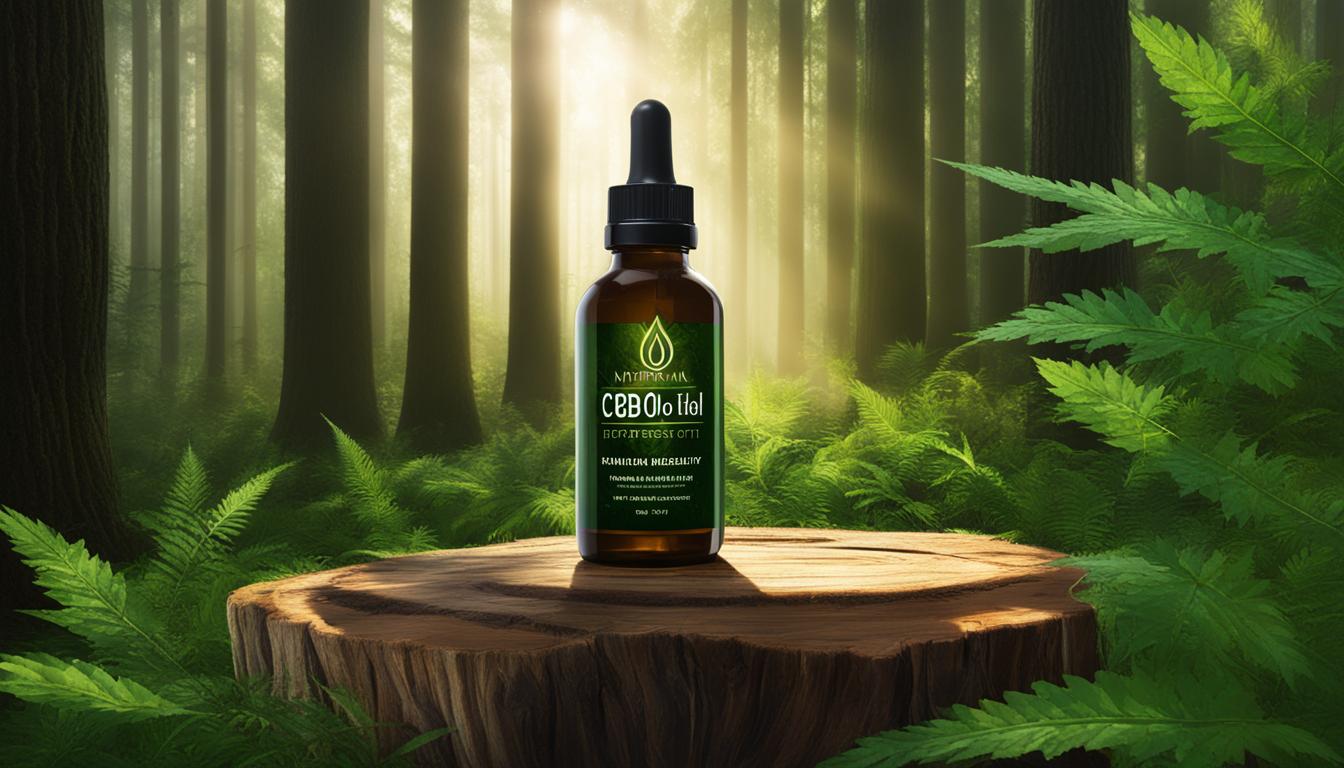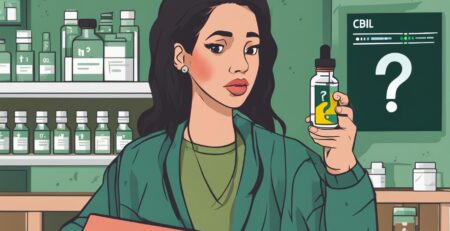CBD for Depression and Anxiety: Natural Relief
The quest for holistic approaches to depression and anxiety has paved the way for the emergence of CBD, short for cannabidiol, as a much-discussed option in the arena of natural remedies for mental health. Extracted from the Cannabis sativa plant, CBD has captivated the interest of those seeking a natural bearing on emotional well-being. Curiosity and anecdotal evidence have positioned CBD for depression and anxiety as a hopeful adjunct to traditional treatments, with advocates touting its benefits and minimal psychoactive effects—a stark contrast to its cousin compound, THC.
Despite a flurry of enthusiasm, the scientific community remains in contemplation, urging a tempered approach until more conclusive research is at hand. As the CBD market flourishes, so too does the imperative for consumers to navigate it with a discerning eye, acknowledging both the possibilities and the provisional state of current knowledge.
Key Takeaways
- The burgeoning interest in CBD for managing mental health is indicative of a broader shift towards plant-based wellness strategies.
- Distinguishing CBD from THC is crucial for understanding its potential role in alleviating symptoms without psychoactive effects.
- Absolute scientific consensus on CBD's benefits for anxiety and depression remains pending, calling for prudence and comprehensive study.
- Accessibility of CBD in various forms has made it a popular choice for those exploring natural mental health support.
- With legal manufacture in the U.S., CBD's inclusion in everyday products highlights its growing acceptance, though regulation lags behind.
- The importance of patient-consumer education and dialogue with healthcare providers about CBD use cannot be overstated.
Understanding CBD: A Natural Compound of Cannabis Sativa
The Cannabis sativa plant yields more than its well-known psychoactive component, THC; it is also the source of cannabidiol, known as CBD, a compound generating significant curiosity for its potential role in alternative treatment for anxiety and depression. Unlike THC, CBD is non-psychoactive, sidestepping the high and instead pointing to efficacious territories in mood regulation and well-being—with cbd for mood disorders increasingly becoming a focal point of interest.
Manifold forms of CBD—from oils to capsules—have entered the market, legal for consumption when derived from hemp, each becoming a beacon for those hunting natural therapies for life's mental agitations. It's this very versatility and accessibility that underwrite CBD's ascent as an alternative method for addressing conditions such as Parkinson's, multiple sclerosis, and a spectrum of mental health issues spanning schizophrenia, PTSD, to the common adversaries of anxiety and depression.
CBD's distinction from THC lies not only in its non-psychoactive profile but in the promise it holds as a potential adjunct or alternative to traditional pharmaceuticals in the ongoing battle against mood disorders and mental health conditions.
As discussions around cbd for mood disorders gain volume and the list of purported benefits lengthens, the scientific exploration into its alternative treatment for anxiety and depression abilities gains intensity—ushering in a new era of potential plant-based remedies that advocate for a gentler approach to personal health maintenance.
| Compound | Source | Psychoactive | Legal Status (Derived from Hemp) | Common Uses |
|---|---|---|---|---|
| CBD | Cannabis sativa | No | Legal | Anxiety, Depression, Pain, Seizures |
| THC | Cannabis sativa | Yes | Varies by state | Recreational, Medicinal |
As research delves deeper, CBD stands on the threshold of becoming a mainstream recommendation for those seeking solace without intoxication—a natural ally in the quest for psychological balance and serenity.
Exploring the Popularity of CBD
The uptick in cbd and mental wellness interest has not gone unnoticed in the United States. An array of products promising cbd for anxiety relief and aiding in managing depression with cbd have captured the public's attention, reflecting a wider acceptance of cannabinoid-infused solutions for health issues, including anxiety and depression.
Recent surveys capture a snapshot of this burgeoning trend, registering a wave of adults turning to CBD. They seek solace for ailments like chronic pain and sleeplessness and potential reprieve from the heavy fog of mental health woes. This surge correlates with the personal anecdotes that praise CBD's impact on well-being, echoing through online forums and word-of-mouth narratives.
Despite the drumroll of growing popularity, the scientific community calls for patience. Research investigating CBD's efficacy against a spectrum of diseases and mental health disorders is underway, but currently, the verdict rests on a pile of yet-unconcluded studies. This cautionary note does not dampen the intrigue that surrounds the compound, leaving many to wonder about CBD's full potential.
From personal stories to preliminary research findings, CBD's role in mental health care is being written in real time, reflected in the swell of interest amongst a demographic eager for relief.
As the marketplace continues to respond to this demand, an explosion of accessible forms of CBD have taken shape, each touting the ability to support mental equilibrium. Here, we take a closer look at the products driving CBD's popularity, the personal testimonials fueling it, and the promising areas where impending research might solidify CBD's standing.
- Growth of CBD Usage in Mental Health
- Personal Testimonials and Consumer Reports on CBD Efficacy
- Ongoing Research and Studies in the Field
- Diverse Product Range and Access Points for CBD Acquisition
Whether exploring CBD's full impact is just on the precipice of discovery or part of a fleeting wellness trend, one thing is certain—the conversation about cbd for anxiety relief and managing depression with cbd has only just begun.
Distinguishing Between CBD and THC
When navigating the world of cannabinoids, the two most prominent compounds from the Cannabis sativa plant that come to the forefront are cannabidiol (CBD) and tetrahydrocannabinol (THC). While they both hail from the same plant, their effects on the human brain and perception are markedly divergent. THC is the culprit behind the psychoactive experience synonymous with marijuana use, producing the ‘high' sensation that has influenced much of the plant's legal and cultural history.
In contrast, CBD is lauded for its absence of psychoactive effects, which has made it immensely appealing to individuals seeking the potential therapeutic benefits attributed to cannabis without the intoxicating aftermath. This key difference has catalyzed a surge in interest and research surrounding cbd for depression and anxiety, positioning CBD as a more socially and legally acceptable form of cannabinoid, especially in countries like the United States where its legal status reflects this distinction.
CBD's ascent as a preferred option for those exploring alternative treatments for mood disorders lies in its perceived ability to offer therapeutic relief without altering one's state of consciousness, a unique characteristic that sets it apart from THC.
Careful to maintain this critical distinction, researchers continue to probe the depths of CBD's potential, unraveling its nuances and assessing its utility in the context of mental wellness, particularly its implications for managing conditions such as depression and anxiety. A greater understanding of CBD's biochemical mechanisms promises to unlock new avenues for treatment, irrespective of THC's contrasting psychoactive properties.
As the discourse surrounding cannabinoid therapy matures, the conversation increasingly gravitates towards the following points of comparison:
| Aspect | CBD | THC |
|---|---|---|
| Psychoactive Effects | No | Yes |
| Legal Status (Federal, U.S.) | Legal when derived from hemp | Federally illegal but varies by state |
| Primary Use | Potential therapeutic applications including for depression and anxiety | Medicinal and recreational |
| Research Interest | Increasing for potential non-intoxicating therapeutic benefits | Primarily focused on effects of psychoactivity and medical utility |
Continued research and user experiences will further elucidate the roles of CBD and THC, crafting a clearer landscape for those pursuing cbd for depression and anxiety. The promise of CBD as a non-psychoactive alternative continues to drive consumer interest and scientific inquiry, carving out its unique niche in the broad spectrum of mental health solutions.
The Legal Status of CBD in the United States
The landscape of legalities concerning CBD for anxiety relief and the benefits of CBD oil for depression is as diverse as the country itself. In the United States, CBD that is derived from the hemp plant is deemed legal under federal law, which has given rise to a multitude of products ranging from dietary supplements to personal care items that are infused with CBD. However, each state has the authority to implement its own regulations and policies regarding the sale and distribution of CBD, creating a patchwork of rules that consumers must navigate.
Although CBD is widely accessible, it's important to delineate between general market availability and FDA approval. The FDA currently recognizes CBD as an active ingredient in one prescription drug that treats certain forms of epilepsy. Consequently, CBD's legal status carries the caveat that although it can be purchased in diverse forms—from oils and tinctures to edibles and topicals—most of these products have not been evaluated or approved by the FDA for safety, purity, or effectiveness.
This lack of FDA oversight means that product claims regarding the benefits of CBD oil for depression or its efficacy in providing anxiety relief have not been substantiated through rigorous clinical trials. Therefore, consumers are advised to exercise due diligence when selecting CBD products and consult healthcare professionals when considering CBD as a supplement for managing mental health conditions.
| FDA Position | Legality | Approval for Seizure Disorders |
|---|---|---|
| Limited approval | Federally legal from hemp | Yes, with prescription |
| No comprehensive testing for other uses | Varies by state laws | No approval for anxiety or depression |
The ongoing evolution of CBD's legal standing requires cognizance of the fluid nature of laws and regulations, reflecting a nation in cautious embrace of the potential health benefits stemming from the cannabis plant. While the opportunity to utilize CBD for personal health grows, so does the collective imperative to advance research and establish a regulatory framework that assures safety and efficacy.
Evidence Supporting CBD for Anxiety Relief
In exploring how CBD helps with anxiety, a substantial body of anecdotal evidence backed by scientific studies has begun to illuminate its potential. The rise of CBD as a hopeful contributor to mental wellness and its possible role in managing depression with CBD draws significant interest. By delving into case studies, we can capture the firsthand experiences of real individuals—anecdotes that, when paired with clinical research, strengthen the hypothesis of CBD's therapeutic benefits.
Case Studies: Real People, Real Results
Individual narratives and success stories play a critical role in understanding CBD for depression and anxiety. Users across various demographics report improved symptoms of anxiety after using CBD, offering a semblance of qualitative proof that this natural remedy may hold merit.
Clinical Research: From Animals to Humans
Decades of animal research have set the stage for human trials exploring CBD for anxiety relief. Early research on animals suggested a dose-dependent decrease in anxiety-like behaviors, a finding which has paved the way for recent human studies. For instance, a 2019 study highlighted a reduction in anxiety symptoms among teenagers after using CBD, marking a significant step forward in clinical validation.
The Role of Serotonin in CBD’s Effectiveness
Current theories posit that CBD's interaction with serotonin receptors may underlie its potential effects on mood and anxiety. These receptors are instrumental in mood regulation, and medications targeting them are commonly prescribed for anxiety and depression. Further research is required to confirm these initial findings and unravel the full story of CBD and mental wellness.
An In-Depth Look at CBD for Depression Alleviation
Amidst the growing body of research on CBD for depression and anxiety, there is a significant community of individuals who advocate for a holistic approach to depression and anxiety. This inclusiveness of alternative treatments signifies a shift in how we understand and treat mood disorders. Cannabidiol, most commonly referred to as CBD, is at the forefront of this shift, offering new hope for a natural remedy.
Understanding Depression and CBD’s Potential Impact
Depression, with its complex emotional and physiological effects, has often been managed with pharmacological interventions. However, the emerging narrative on benefits of CBD oil for depression adds a new perspective. There is an ongoing investigation into CBD's influence on serotonin receptors and neurochemical pathways, paralleling the action of many anti-depressive drugs.
Surveying the Impact: CBD Users’ Experiences
Personal accounts and surveys provide insight into CBD's reception among those battling depression. A striking number of individuals have reported that incorporating CBD into their regimen has led to improved wellness, positioning CBD for mood disorders as a beneficial supplement in their holistic health repertoire. As user experiences accumulate, they beckon more rigorous scrutiny and scientific validation.
Investigating the Links: CBD Use and Mood Disorders
Research initiatives continue to probe the potential association between cbd for anxiety relief and alleviating depressive symptoms. Although peer-reviewed clinical data is not yet sufficient to draw definitive conclusions, the promise of CBD elicits both hope and curiosity. With science gradually piecing together the complexities of CBD and its neurological implications, the future could see a significant paradigm shift in how mood disorders are understood and managed.
CBD Dosage and Administration for Mental Wellness
The conversation around CBD for depression and anxiety requires an understanding of optimal dosage and administration. As a natural remedy for mental health, determining the right amount of CBD is a common challenge for individuals seeking to manage mood disorders with this non-psychoactive compound. The quest for establishing an effective dosage is complicated by variables such as individual body chemistry, the severity of symptoms, and the method of CBD delivery.
Unlike prescription medications, CBD products often lack standardized dosing recommendations, with studies investigating a wide spectrum of quantities. This inconsistency contributes to the uncertainty that potential users face. To compound the issue, the lack of regulation in the manufacturing process provokes questions about the actual content of CBD in products, as well as their purity and potential contaminants.
The Food and Drug Administration (FDA) is actively working to create a framework for evaluating and approving CBD products. This effort aims to provide clarity to consumers and healthcare providers alike. Until the FDA's evaluations are established, however, the best course of action is to approach CBD use with caution, starting with low doses and responsibly observing effects.
| Consideration | Impact on Dosage |
|---|---|
| Body Chemistry | Individual differences dictate varied responses to CBD. |
| Symptom Severity | More severe symptoms might require higher doses, pending professional guidance. |
| Delivery Method | Oils, tinctures, edibles, and topicals can alter absorption rates and effectiveness. |
| Lack of Regulation | Uncertainty regarding the consistency, purity, and concentration of CBD products. |
| FDA Approval Process | Anticipated guidelines to standardize dosage and ensure product quality. |
Consultation with healthcare professionals remains a crucial step before starting any dosing regimen involving CBD, especially when dealing with mental health concerns like depression and anxiety. Only through careful monitoring and adherence to forthcoming regulations can individuals truly harness CBD's potential as a natural remedy for mental wellness.
Comparing CBD with Traditional Anxiety and Depression Treatments
When it comes to alternative treatment for anxiety and depression, CBD, or cannabidiol, has surfaced as a popular option. However, unlike traditional treatments which have FDA approval and are backed by extensive clinical trials, cbd for depression and anxiety is largely supported by anecdotal evidence. This key distinction raises important considerations for those evaluating the efficacy and safety of CBD as a potential therapeutic agent.
Traditional anxiety and depression medications are the result of scientific rigour, with established dosages and recognized efficacy. They operate within a firmly regulated environment, which provides a level of assurance in terms of purity and expected therapeutic outcomes. This contrasts with the current landscape for CBD products, which, though abundant, are not held to the same stringent approval processes.
CBD's rise as a natural treatment option must be contextualized within the landscape of existing, regulated mental health interventions. The divergence in evidence and oversight is a fundamental point of comparison between CBD and conventional therapies.
In considering cbd for depression and anxiety, it's crucial to understand both the potential benefits and the limitations implied by the current state of research and regulation. Consumers are often swayed by compelling testimonials which champion CBD's effects, yet without the grounding of formal approval, certainty remains elusive.
| Treatment Type | Regulatory Approval | Evidence Level | Known Side Effects | Usage |
|---|---|---|---|---|
| Traditional Medications | FDA-approved | Backed by clinical trials | Documented and Researched | Prescribed Dosages |
| CBD Products | Lacking comprehensive approval | Anecdotal and emerging research | Less documented, variable | Self-regulated, varied forms |
This table underscores the contrast between the structured world of traditional pharmacology and the more fluid, evolving realm of CBD use. Without the filter of scientific consensus, managing depression with cbd and seeking anxiety relief through cannabidiol involves a different set of expectations and a reliance on personal discernment.
As ongoing research seeks to bridge the gaps in knowledge about CBD's therapeutic potential, individuals considering its use must critically assess their options. With the future landscape of cannabinoid-related mental health treatments taking shape, staying informed and mindful of the differences between CBD and traditional therapies becomes ever more salient.
CBD Products: Types and Uses
The dynamic and expanding world of CBD has led to an assortment of products hitting the market, each claiming to offer the benefits of CBD oil for depression and provide relief to those suffering from anxiety and depression. Consumers can now choose from a broad spectrum of CBD forms, including but not limited to oils, capsules, sprays, lotions, edibles, and beverages.
Whether it is for the convenience of a capsule or the fast action of a sublingual oil, each CBD product purports to offer a unique way to help manage depression and anxiety. Yet, buyers must navigate these options with caution, considering the stark variations in concentration and unclear evidence concerning their effectiveness.

Understanding the complexities of each product type and their purported uses is fundamental to making an informed decision. Below is a comparative breakdown detailing what consumers should know when considering the diverse range of CBD products available:
| Product Type | Intended Use | Administration Method | Notes |
|---|---|---|---|
| CBD Oils | General wellness, anxiety relief | Sublingual drops | Variable concentrations; popular for versatility |
| CBD Capsules | Mood support, daily supplement | Oral ingestion | Dosed for convenience; delayed onset of effects |
| CBD Sprays | Quick stress relief | Sublingual or oral spray | Easy to use; less precise dosing |
| CBD Lotions | Localized comfort, skin health | Topical application | Non-systemic effects; additional skincare benefits |
| CBD Edibles | Long-term wellness, subtle effects | Oral ingestion | Ranged potency; delayed absorption with longer duration |
| CBD Beverages | Hydration and calming | Drinking | May offer casual social consumption |
Despite their proliferation, substantiation for these products' effectiveness specifically for cbd for depression and anxiety lacks the rigour of clinical validation. Thus, the dialogue around the benefits of CBD oil for depression continues, dominated more by consumer experiences than by empirical evidence.
Until comprehensive studies can offer consistent guidance, consumers are encouraged to navigate this evolving marketplace with an emphasis on personal research, consulting with healthcare professionals, and assessing the credibility of each product and provider.
CBD for Depression and Anxiety: Navigating User Testimonials
In the ever-expanding conversation about how CBD helps with anxiety and depression, user testimonials often serve as a catalyst for curiosity and potential acceptance. These narratives from individuals about the perceived efficacy of CBD in their personal struggles with mental health have contributed significantly to the intrigue and allure surrounding cbd for depression and anxiety.
However, while these accounts provide a human element to the debate, they are not without limitation. The individual nature of these experiences and the subjective perception of improvement underscore the necessity for objective, controlled clinical trials. Such trials are the gold standard for assessing treatment efficacy and safety, providing the rigor needed to validate anecdotal success stories.
For those considering CBD as a potential treatment for depression or anxiety, it's crucial to critically evaluate the source and context of user testimonials. Anecdotal evidence may offer a compelling narrative, but only scientific research can provide the confirmatory backing needed for such claims to be considered reliable.
Seeking authentic stories of cbd for depression and anxiety is a reasonable step for prospective users. Still, these stories should not overshadow the importance of corroborating CBD's benefits with solid scientific evidence.
- Assess the plausibility and relevance of testimonials
- Consider the representativeness of individual experiences
- Seek testimonials backed by scientific research when available
- Be mindful of placebo effects and the power of suggestion
- Recognize the gap between personal narratives and clinical validation
In summary, user testimonials can be insightful but should be approached with a discerning mind, supplemented by an active pursuit of clinical evidence for cbd for depression and anxiety. Doing so ensures a balanced understanding of how CBD helps with anxiety and mood disorders, aligning expectations with factual data and paving the way for more informed decision-making.
Addressing the Safety of CBD
As the prevalence of CBD for depression and anxiety continues to rise, it is essential to address concerns surrounding its safety and regulatory status. Many individuals turn to CBD as a natural remedy for mental health, trusting in its therapeutic potential without a complete understanding of its potential side effects and interactions with other medications.
Potential Side Effects and Interactions
Scientific studies indicate several potential side effects associated with CBD use, such as sleepiness, decreased appetite, and diarrhea. Some individuals may experience mood changes or more severe reactions like liver damage and male infertility. Additionally, CBD can influence the effects of other drugs through interactions that may lead to unintended consequences. This is particularly pertinent for those using CBD for anxiety relief in conjunction with other prescriptions, underlining the critical need for initiating conversations with healthcare providers about CBD use.
Regulation and Quality Assurance of CBD Products
The unregulated nature of the CBD market raises questions about the accuracy of product labels and the purity of the contents within. Given that the FDA has not confirmed the safety or the exact concentrations of CBD in off-the-shelf products, consumers are at risk of exposure to inaccuracies and potential contaminants. Rigorous quality assurance is lacking in this burgeoning industry, leaving the benefits of CBD oil for depression and anxiety overwhelmingly dependent on manufacturers' integrity and self-regulation.
User’s Guide: What to Consider Before Using CBD
When contemplating managing depression with CBD, consumers should be aware of a variety of critical factors. These include the possibility of encountering products with incorrect dosage information or the inclusion of unlisted ingredients like THC. The absence of standardized manufacturing oversight could lead to contamination, while the effective dosage for relieving symptoms remains uncertain. Current efforts to establish regulatory frameworks for CBD products are underway, aiming to bring clarity and safety guarantees to consumers in the future.
Alternative Natural Remedies for Mental Health
Amidst the ongoing exploration of holistic approaches to depression and anxiety, the potential of natural substances such as CBD has witnessed a surge in public and academic interest. However, the scientific and wellness communities are broadening their scope beyond cbd for depression and anxiety and are keenly investigating other plant-derived compounds that may offer therapeutic benefits.
One such substance gaining attention is psilocybin, the psychoactive component found in certain mushrooms. Another is dimethyltryptamine, better known as DMT, a compound found in several plant species and known for its psychedelic effects. Both substances are in the nascent stages of research for their potential benefits in treating mental health conditions. Public discourse circles around the transformative experiences that these compounds are reputed to facilitate, suggesting their potential for a holistic approach to depression and anxiety.
Although CBD remains a prominent subject of this investigation, its current backing by scientific evidence as an effective form of treatment for mental health conditions requires further substantiation through controlled studies. There exists an increasing imperative for in-depth research, not only into CBD but these alternative compounds as well.
Below is a table comparing the characteristics of CBD, psilocybin, and DMT to provide a clearer understanding of their respective roles and the current evidence supporting their use:
| Compound | Natural Source | Legal Status | Current Evidence for Depression/Anxiety | Potential for Holistic Mental Health Approach |
|---|---|---|---|---|
| CBD | Cannabis sativa | Federally legal (derived from hemp) | Emerging anecdotal and preliminary clinical studies | High, especially due to non-psychoactive properties |
| Psilocybin | Certain mushroom species | Illegal (under federal law), decriminalized in some local jurisdictions | Limited but promising clinical research | Subject to ongoing research and legal reform |
| DMT | Various plant species | Illegal (under federal law) | Minimal; mostly anecdotal accounts and early-stage studies | Contingent upon future research and potential legal changes |
The above comparisons highlight the diverse nature of natural compounds being considered in the context of mental health. While enthusiasts advocate for these options based on anecdotal evidence, the scientific community is tasked with providing a rigorous evaluation of their safety, efficacy, and appropriate usage contexts.

Moving forward, the implications for mental health treatment paradigms are significant. An increase in reliable, peer-reviewed studies could pave the way for these alternative natural remedies to be embraced more widely within therapeutic settings. The pursuit to understand and harness their potential to provide relief for depression and anxiety continues with growing anticipation.
Guidelines for Consulting Healthcare Providers About CBD Use
In the midst of the growing interest in cbd for depression and anxiety, open conversation with healthcare providers is imperative for those considering or already managing depression with cbd. Transparency is key to fully understanding the potential benefits and risks associated with CBD use, especially given its interactions with other medications. Patients should be well-informed and guided safely as they navigate through the complexities of this natural remedy.
Engaging in a thorough dialogue with medical professionals ensures that patients receive comprehensive care that integrates CBD use with standard treatments, if deemed appropriate.
Many individuals may hesitate or neglect to discuss their use of CBD with their physicians. This omission can lead to a disjointed treatment plan or unforeseen medical complications. Therefore, patients must be proactive in sharing information regarding all substances they're using for health-related purposes, including CBD.
Below is a checklist for those seeking to incorporate CBD into their mental health regimen:
- Inform your healthcare provider about any CBD products you are using or considering.
- Discuss the specific reasons you are interested in cbd for depression and anxiety.
- Review any potential interactions with medications you are currently taking.
- Ask about the appropriate dosage and form of CBD that may be best for your particular situation.
- Seek advice on reputable brands and forms of CBD to ensure quality and safety.
Implementing these guidelines contributes significantly to a patient's well-being and can lead to a safer, more effective approach to managing depression with cbd. Further dialogue and shared decision-making between patients and providers can effectively steer the course of treatment, aligning patient needs with medical expertise.
Finally, with the healthcare landscape evolving to accommodate more natural and holistic remedies, patients can expect to encounter a range of views and recommendations. Maintaining open channels with healthcare providers ensures that both scientific evidence and individual wellness goals shape the journey towards mental health management.
A Look into Future Research on CBD and Mental Health
The trajectory of research into cbd for depression and anxiety promises a revolving door of emerging studies aimed at illuminating the intricate mechanism by which CBD interacts with mental health conditions. Positioned at the intersection between traditional treatment modalities and burgeoning natural remedies, CBD's promise for patients suffering from mood disorders continues to stir the scientific community and pique public interest.
As researchers globally are increasingly granted access to conduct rigorous trials, a nuanced understanding of the benefits of cbd oil for depression and anxiety is beginning to take shape. These studies, both preclinical and clinical, are set to expand the frontiers of our knowledge, potentially fortifying CBD's role in mental health care with a solid empirical foundation.
Current investigations have opened the doors to a reservoir of queries and hypotheses, prompting a multitude of controlled clinical trials. These future endeavors are expected to adopt a multi-dimensional approach, analyzing not just the efficacy of CBD, but also optimal dosing, modalities of delivery, and the long-term impact on psychological well-being.
The anticipated development of larger-scale randomized controlled trials intends to scrutinize the therapeutic value of CBD, aiming to determine whether it meets the high standards of medical treatment efficacy and safety. As the legal framework surrounding cannabis continues to evolve, it is expected that the coming years will witness a surge in high-quality trials, both across the United States and internationally.
Central to the forthcoming wave of research is a patient-centered focus, addressing questions most pertinent to those seeking relief from anxiety and depression, thereby shining a scientific spotlight on the potential benefits of cbd oil for depression.
Future research aims to uncover:
- How specific dosages and forms of CBD affect different types of mood disorders.
- The long-term efficacy and safety of using CBD for emotional well-being.
- Any potential side-effects or contraindications associated with CBD use.
- The comparative effectiveness of CBD versus traditional pharmaceutical interventions.
The definitive force behind CBD's rise in the health sector could unfold as empirical data is harvested from these studies, potentially precipitating a significant paradigm shift in how healthcare professionals and patients approach cbd for depression and anxiety. With this burgeoning array of inquiry, the years ahead are poised to yield insights that could carve a legitimate, scientifically verified place for CBD within the realm of mental health treatment.
Conclusion
In the pursuit of natural remedies for mental health, CBD has emerged as a beacon for those searching for alternative treatments for depression and anxiety. The collective interest in CBD's therapeutic promise reflects a broader societal inclination toward plant-based health practices and signals a transformation in the mental wellness landscape. As the dialogue around cbd for depression and anxiety continues to expand, the importance of backing anecdotal claims with robust scientific research becomes all the more critical.
The current state of CBD, marked by rapid growth in consumer use and interest, is still in its infancy when it comes to empirical validation. Consequently, individuals and healthcare professionals must navigate the promising yet uncertain terrain with a careful and informed approach. Being up-to-date with ongoing research, legal developments, and regulatory changes is essential. It ensures that the use of cbd for depression and anxiety is not only approached with optimism but also grounded in knowledge and prudence.
Ultimately, as we embrace CBD and its potential to elevate mental wellness, the commitment to evidence-based practices stands as a fundamental guiding principle. Although the future holds promise, it is the meticulous process of scientific inquiry that will determine the rightful place of CBD within the spectrum of natural remedies for mental health.
FAQ
What is CBD and how might it benefit mental health?
CBD, or cannabidiol, is a natural compound found in the Cannabis sativa plant. It has gained interest as a potential natural remedy for mental health conditions such as depression and anxiety due to its interaction with the body's endocannabinoid system, which plays a role in regulating mood and stress levels.
Can CBD help with anxiety and depression symptoms?
Some initial studies and anecdotal evidence suggest that CBD may help alleviate symptoms of anxiety and depression by potentially influencing serotonin receptors in the brain, though further research is needed to establish its efficacy and safety.
What differentiates CBD from THC?
CBD and THC are both cannabinoids from the Cannabis sativa plant, but they differ in their effects. THC is psychoactive and can produce a ‘high,' whereas CBD does not have this effect and is often sought after for its potential therapeutic benefits without inducing intoxication.
Is CBD legal in the United States?
Yes, CBD derived from hemp with less than 0.3% THC is legal at the federal level in the U.S. It can be found in various forms such as oils, capsules, and topicals, though the regulation of these products can vary by state.
What type of evidence exists supporting CBD’s use for anxiety relief?
Evidence supporting CBD for anxiety relief includes case studies, anecdotal reports, and a handful of clinical trials. Some studies have shown that CBD may reduce anxiety behaviors in animals and in humans, but more research is needed to confirm these findings.
What is the recommended dosage of CBD for depression or anxiety?
The optimal dosage of CBD for depression or anxiety is not currently established, partially due to varying doses used in studies and the lack of regulation concerning product purity and labeling. Users should consult with a healthcare professional to determine an appropriate dosage.
How does the safety of CBD compare to traditional medications for anxiety and depression?
Traditional medications for anxiety and depression are FDA-approved and have been through rigorous clinical testing. CBD, on the other hand, lacks comprehensive clinical trial data and FDA approval for treating these conditions, so its safety profile is not as well understood.
What considerations should users have when selecting CBD products?
Users should consider factors like the potential presence of THC, discrepancies in labeling, quality assurance, lack of regulation, and the absence of established effective dosages when selecting CBD products. It's important to use high-quality, lab-tested products and consult a healthcare provider.
Are there any side effects associated with CBD use?
Potential side effects of CBD include drowsiness, changes in appetite, gastrointestinal issues, mood changes, possible liver damage, and interaction with other medications. It's important to discuss CBD use with a healthcare provider, especially if taking other medications.
What are alternative natural remedies for mental health beyond CBD?
Other natural remedies for mental health that are being researched include substances like psilocybin and dimethyltryptamine (DMT), as well as lifestyle interventions such as exercise, mindfulness meditation, and dietary changes. However, individuals should seek professional advice before trying any new treatment.
Should I talk to my healthcare provider about using CBD for depression and anxiety?
Yes, consulting with a healthcare provider before using CBD for depression and anxiety is crucial. They can offer guidance on potential benefits and risks, consider any possible drug interactions, and help you integrate CBD into your treatment plan safely if appropriate.
What does the future of CBD research look like for mental health?
The future of CBD research for mental health is promising as more clinical trials are being conducted to better understand its potential benefits and limitations for treating conditions such as anxiety, depression, and other mood disorders.











Leave a Reply